Another wonderful Thursday
Read/Post Comments (2)
It's Thursday, and on Thursday, Lara and I go on an adventure.
This afternoon, I thought it would be fun to go to this restaurant:
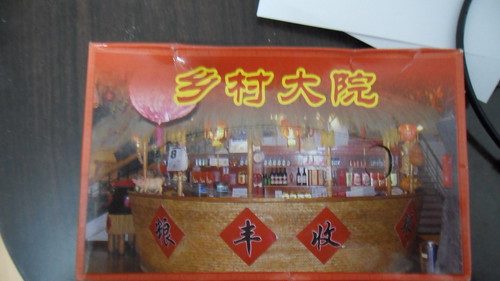
That's the top of a box of tissues that I'd gotten from the restaurant last summer. (I ended up leaving the box here with a friend of mine because my luggage was too full to carry it; she gave it back to me when I got here in January.) The restaurant is a kitschy, Mao-era ripoff - the Chinese version of Johnny Rockets, for you North American types. We have pseudo-50's diners; the Chinese have pseudo-countryside courtyard restaurants. (Who knew?? I would never have imagined that Mao kitsch would be popular - nay, possible, even - here.)
Anyhow, I had no idea what the restaurant was called. I just had a vague notion that the address must be SOMEWHERE on this box. I checked the bottom:
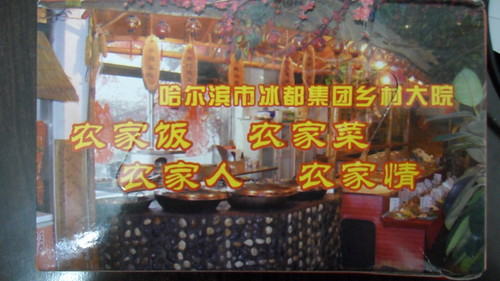
Nothing. The repetition of the characters 农家 made me think I was looking at an advertising slogan of some sort, and that turned out to be true: When I checked the dictionary, I learned that it says, more or less, "Peasant restaurant. Peasant food. Peasant people. Peasant atmosphere."
I checked the side:
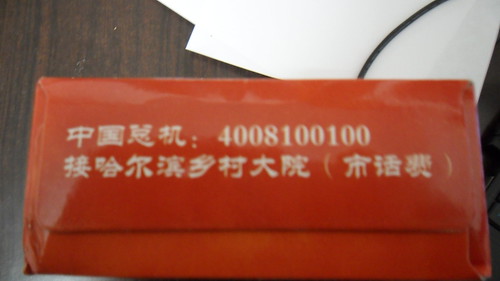
Nothing. Dunno what that number is, but it's not a phone number.
I checked the other side:
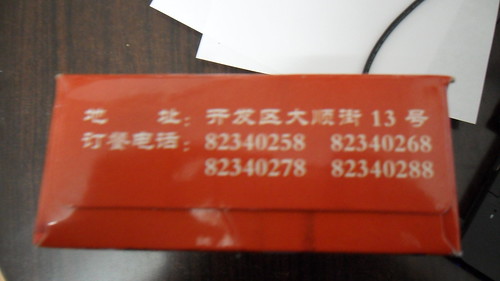
Yee, ha! Pay dirt. I recognized the numbers at the bottom as phone numbers, and I recognized the characters "电话," which mean "dianhua"-"telephone."
Then I saw this character: 地. It means "di," which translates to "ground" or "floor" or "place." That had to be part of the word "address," right? Then I looked at the following characters, and recognized "区," which means "qu," which translates to "district." So I knew I had the address; and I remembered that Chinese write addresses from the largest element to the smallest - first they'd listed the district, then the street, and then finally the street number. I then easily identified the characters that represented the district and the street. It's like they came into focus at that moment; prior to then they weren't meaningful at all, but all of a sudden I could read some of them, once I expected them to make sense and knew what kind of sense they should make.
I then needed to figure out which district of the city the restaurant was in. I tried writing the characters on my iPod (which accepts handwritten characters as input), but I couldn't get it to understand me. (This is often a problem, because I sometimes get the stroke order wrong when I write characters, and the input feature is a computer program, thus really pretty stupid about guessing what you MIGHT have meant.) So, I decided I better look at my map.
I quickly realized that the restaurant is in the Nangang district of Harbin, which didn't help a lot . . . Nangang spans the city. I'd planned to look for the characters that represented the street, but I soon realized I'd be stuck at that task all night . . . Reading the map isn't easy for me, because the characters are printed very small, and it's hard enough these days for me to read small print in English, let alone in a text where I can't reliably identify the significant elements. (Imagine not being able to tell the difference between the letter b and the letter d, for instance . . . not being entirely sure which way they should point, or when the d becomes an a . . . )
So then I thought about using an online map. Can't use Google or Yahoo, though, because the Chinese government doesn't like the street-level view; they consider it an invasion of privacy. (Imagine THAT!) I then remembered that my friend Wencui had used my computer to look up an address and bus route on a Chinese map site the other day. So I scanned the browsing history, and sure enough, I found it.
First I tried entering the address, but got a message that said "I can't blah blah bus blah," which I took to mean that the mapping program couldn't find a bus stop with that name. So I went back along the breadcrumbs at the top of the page until I got to just the map, no bus routes. When I entered the address there (MS has an add-on that will let you type in pinyin and it'll return characters), the map popped up. All in Chinese characters, of course.
So I zoomed in on the map and tried to figure out where the restaurant was, relative to the campus. I thought to myself, "Oh, Zhong Shan Lu! I know where that is!"
And at that point, I did a double-take.
I was reading the map. In Chinese.
It took my breath away, it really did. I can't even begin to explain how excited I got. I mean, it's not really reading; it's still proto-reading, supported by lots and lots and lots of context. But every little step is a step closer to actual reading. For example, I can read "zhong" and "shan" wherever they appear; "lu," I'm less sure about - but every time I encounter it, I get closer to remembering it.
And that's not even the really exciting part. The best part is the detective work I did to get there; finally, finally, finally I'm getting enough tools to be able to put things together. Learning French and German was a piece of cake by comparison; even when we traveled in the Netherlands without a word of Dutch, the fact that we had the alphabet meant that we could do pattern-matching, even if we had no idea what the words meant. But in Chinese, the patterns have taken a long time to emerge. (I remember my first semester of Chinese class, when I'd try to read a sentence, and I'd recognize the first character, the second . . . and get stumped on the third. All of a sudden, it was as if the characters dissolved, as if the individual strokes broke and scattered like a dropped box of toothpicks. I wondered if kids who have trouble reading English feel like that . . . as if the meaning is a skittish bird that just flies away. I can't remember ever feeling that way about English, but some people must.)
And every little victory is like solving a puzzle, with the attendant feeling of accomplishment and the sense of having tidied something up. Even more, I've long been interested in early literacy, and I feel absolutely privileged to get to experience it all once again, in such a context-rich environment.
This is soooooooooo much fun.
Oh yeah, the food at the restaurant was awesome, too.
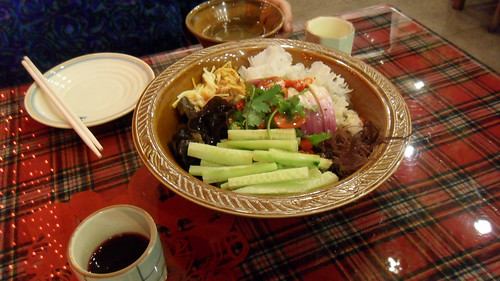
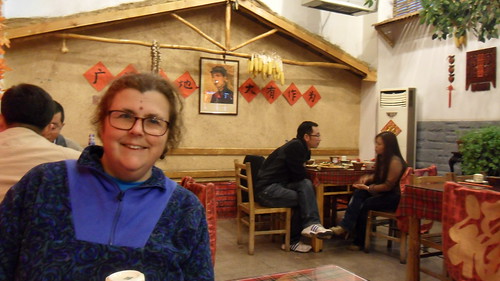
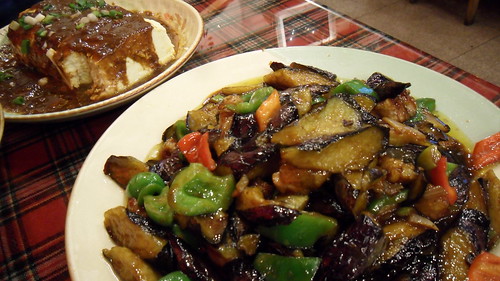
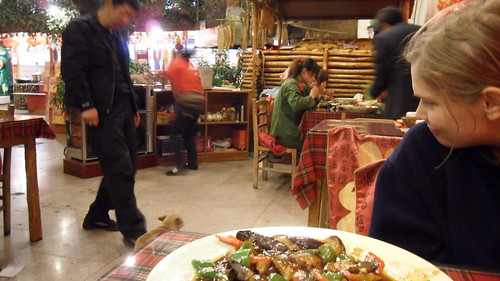
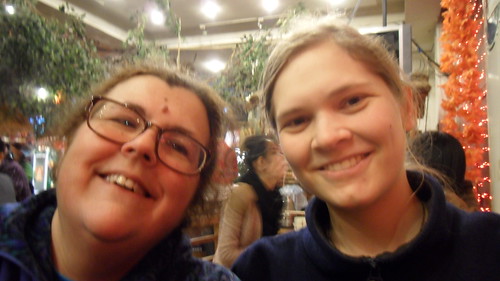
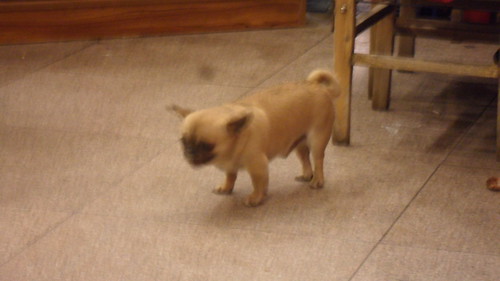
This afternoon, I thought it would be fun to go to this restaurant:

That's the top of a box of tissues that I'd gotten from the restaurant last summer. (I ended up leaving the box here with a friend of mine because my luggage was too full to carry it; she gave it back to me when I got here in January.) The restaurant is a kitschy, Mao-era ripoff - the Chinese version of Johnny Rockets, for you North American types. We have pseudo-50's diners; the Chinese have pseudo-countryside courtyard restaurants. (Who knew?? I would never have imagined that Mao kitsch would be popular - nay, possible, even - here.)
Anyhow, I had no idea what the restaurant was called. I just had a vague notion that the address must be SOMEWHERE on this box. I checked the bottom:

Nothing. The repetition of the characters 农家 made me think I was looking at an advertising slogan of some sort, and that turned out to be true: When I checked the dictionary, I learned that it says, more or less, "Peasant restaurant. Peasant food. Peasant people. Peasant atmosphere."
I checked the side:

Nothing. Dunno what that number is, but it's not a phone number.
I checked the other side:

Yee, ha! Pay dirt. I recognized the numbers at the bottom as phone numbers, and I recognized the characters "电话," which mean "dianhua"-"telephone."
Then I saw this character: 地. It means "di," which translates to "ground" or "floor" or "place." That had to be part of the word "address," right? Then I looked at the following characters, and recognized "区," which means "qu," which translates to "district." So I knew I had the address; and I remembered that Chinese write addresses from the largest element to the smallest - first they'd listed the district, then the street, and then finally the street number. I then easily identified the characters that represented the district and the street. It's like they came into focus at that moment; prior to then they weren't meaningful at all, but all of a sudden I could read some of them, once I expected them to make sense and knew what kind of sense they should make.
I then needed to figure out which district of the city the restaurant was in. I tried writing the characters on my iPod (which accepts handwritten characters as input), but I couldn't get it to understand me. (This is often a problem, because I sometimes get the stroke order wrong when I write characters, and the input feature is a computer program, thus really pretty stupid about guessing what you MIGHT have meant.) So, I decided I better look at my map.
I quickly realized that the restaurant is in the Nangang district of Harbin, which didn't help a lot . . . Nangang spans the city. I'd planned to look for the characters that represented the street, but I soon realized I'd be stuck at that task all night . . . Reading the map isn't easy for me, because the characters are printed very small, and it's hard enough these days for me to read small print in English, let alone in a text where I can't reliably identify the significant elements. (Imagine not being able to tell the difference between the letter b and the letter d, for instance . . . not being entirely sure which way they should point, or when the d becomes an a . . . )
So then I thought about using an online map. Can't use Google or Yahoo, though, because the Chinese government doesn't like the street-level view; they consider it an invasion of privacy. (Imagine THAT!) I then remembered that my friend Wencui had used my computer to look up an address and bus route on a Chinese map site the other day. So I scanned the browsing history, and sure enough, I found it.
First I tried entering the address, but got a message that said "I can't blah blah bus blah," which I took to mean that the mapping program couldn't find a bus stop with that name. So I went back along the breadcrumbs at the top of the page until I got to just the map, no bus routes. When I entered the address there (MS has an add-on that will let you type in pinyin and it'll return characters), the map popped up. All in Chinese characters, of course.
So I zoomed in on the map and tried to figure out where the restaurant was, relative to the campus. I thought to myself, "Oh, Zhong Shan Lu! I know where that is!"
And at that point, I did a double-take.
I was reading the map. In Chinese.
It took my breath away, it really did. I can't even begin to explain how excited I got. I mean, it's not really reading; it's still proto-reading, supported by lots and lots and lots of context. But every little step is a step closer to actual reading. For example, I can read "zhong" and "shan" wherever they appear; "lu," I'm less sure about - but every time I encounter it, I get closer to remembering it.
And that's not even the really exciting part. The best part is the detective work I did to get there; finally, finally, finally I'm getting enough tools to be able to put things together. Learning French and German was a piece of cake by comparison; even when we traveled in the Netherlands without a word of Dutch, the fact that we had the alphabet meant that we could do pattern-matching, even if we had no idea what the words meant. But in Chinese, the patterns have taken a long time to emerge. (I remember my first semester of Chinese class, when I'd try to read a sentence, and I'd recognize the first character, the second . . . and get stumped on the third. All of a sudden, it was as if the characters dissolved, as if the individual strokes broke and scattered like a dropped box of toothpicks. I wondered if kids who have trouble reading English feel like that . . . as if the meaning is a skittish bird that just flies away. I can't remember ever feeling that way about English, but some people must.)
And every little victory is like solving a puzzle, with the attendant feeling of accomplishment and the sense of having tidied something up. Even more, I've long been interested in early literacy, and I feel absolutely privileged to get to experience it all once again, in such a context-rich environment.
This is soooooooooo much fun.
Oh yeah, the food at the restaurant was awesome, too.






Read/Post Comments (2)
Previous Entry :: Next Entry
Back to Top